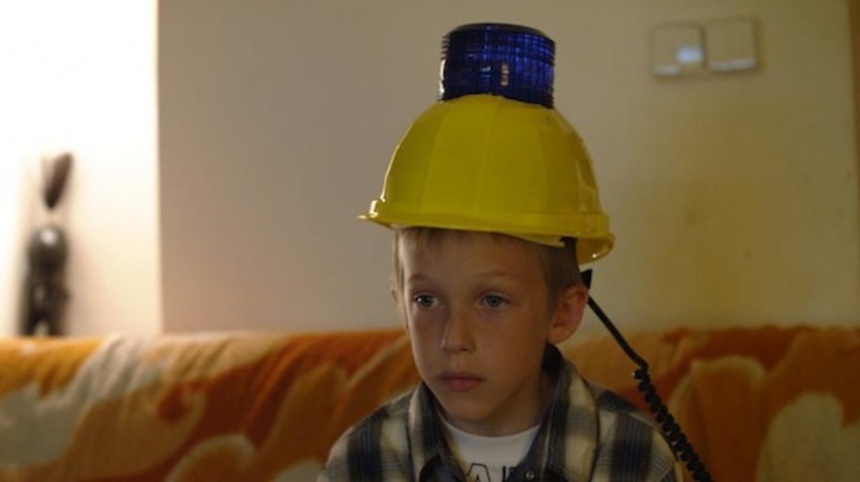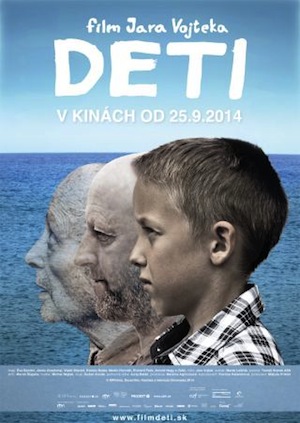Review: CHILDREN, A Lyrical Look At Patrimonial Relationships And Moral Crises

Vojtek is no stranger to the domestic audience. He rose to prominence with the documentary Here We Are [My Zdes], which charts family life in the homeland and uprooted. His next major work, The Border chronicled the small "iron curtain" in the eastern European border. This one earned him a handful of awards on the international circuit. The omnibus Children consists of four vignettes taken from ordinary life. In its form, it evokes recent Slovak social dramas interlocked by the titular subject in one way or the other.
With scandals feeding news on social service taking away kids from parents, or a now infamous case about the death of a 5-year old child via torture, expose profound corrosion and moral crisis in the society´s cells. However Vojtek spins out of this time-frame and current affairs to immerse into the complexity of those relationships, repeatedly lapsing into painful details. As the hints suggest the poetical title wraps a rather bleak observation.
 "Father" concludes the anthology of bitter life stories maintaining the high-set bar. A woman (Éva Bandor) storms on the scene to grab her son from school in a state of mania. The reason behind her hysteria-driven histrionics is soon unveiled as her husband´s cheating. The director inserts a prelude in the form of the woman´s stab on escapism-cum-humiliation before approaching the central subject: the relationship of the cheated daughter and her dementia stricken father (János Gosztoni). The father utters under his breathe a desire to see the sea one more time, a desire that the daughter takes as allusion to abduct him from the nursing home, so they can spend some quality time together.
"Father" concludes the anthology of bitter life stories maintaining the high-set bar. A woman (Éva Bandor) storms on the scene to grab her son from school in a state of mania. The reason behind her hysteria-driven histrionics is soon unveiled as her husband´s cheating. The director inserts a prelude in the form of the woman´s stab on escapism-cum-humiliation before approaching the central subject: the relationship of the cheated daughter and her dementia stricken father (János Gosztoni). The father utters under his breathe a desire to see the sea one more time, a desire that the daughter takes as allusion to abduct him from the nursing home, so they can spend some quality time together.
The opening story "Son" closely watches seemingly a regular duo of a father (Vlado Zboroň) and son (Roman Bubla) in their daily routine. Right from the start something does not add up as the father zealously tries to attract the son´s attention which he tenaciously deflects, demonstrating utter indifference. Vojtek did a documentary So Far, So Near mapping ordinary life situations and everyday difficulties in households with autistic children.
In this way the director benefits from acquired insight and knowledge in the first part of the anthology and adapts the father´s perspective. The father receives a letter from school advising him to commit his son to a special school adding to the already accumulated anxiety prompting him to reach for desperate measures: an alternative healer. The segment plays strongest in face-to-face encounters of the father and his emotionally detached son immersed in another world. "The Son" segment opens as a documentary-esque visit into the home with an autistic person, gravitating towards a social drama in the middle only to end on a heartbreaking and psychological note.
The second story, "Marathon", has a long build-up that leaves viewers hanging in the air for far too long. With no crumbs or hints to pick up, the tracking of a convict´s (Martin Horváth) flight surmounting each hurdle in the way raises the anticipation of his purpose after each passed hindrance. In the end, this segment winds up being a kind of an anecdote on a convict taking a hike for that only reason... and having a bitter taste of it. In this way it merely plays as an interlude before another punch into the gut, "Canary". In this, the father-son scenario repeats, albeit under different circumstances.
A son (11-year-old Arnold Nagy) lives with his dick of a stepfather (Richard Felix) that keeps humiliating and bullying him. The story mounts a perspective of the child in a fatalism laden plot. The son finds comfort from his abuse by taking care of a canary, a manoeuvre echoing Lyzigos´ magnificent oeuvre The Boy Eating the Bird´s Food.
Similarly to Greek drama, the bird has also obvious symbolic connotations. The boy goes to a local bird competition in another town to lift up his spirit, reap the fruits of his work and to seek a day-long asylum from his bullying stepfather. After the competition, an elderly bird expert offers a lift to the boy setting all alarms off under the code "Didn't your mother tell you to not go with strangers in a car" as if the only missing thing in this young protagonist´s martyrdom should be molestation. Vojtek pours salt into open wounds, slyly working out the nefarious atmosphere of sinister anticipation within a hand´s reach of Hanekesque civil horror.
 "Father" concludes the anthology of bitter life stories maintaining the high-set bar. A woman (Éva Bandor) storms on the scene to grab her son from school in a state of mania. The reason behind her hysteria-driven histrionics is soon unveiled as her husband´s cheating. The director inserts a prelude in the form of the woman´s stab on escapism-cum-humiliation before approaching the central subject: the relationship of the cheated daughter and her dementia stricken father (János Gosztoni). The father utters under his breathe a desire to see the sea one more time, a desire that the daughter takes as allusion to abduct him from the nursing home, so they can spend some quality time together.
"Father" concludes the anthology of bitter life stories maintaining the high-set bar. A woman (Éva Bandor) storms on the scene to grab her son from school in a state of mania. The reason behind her hysteria-driven histrionics is soon unveiled as her husband´s cheating. The director inserts a prelude in the form of the woman´s stab on escapism-cum-humiliation before approaching the central subject: the relationship of the cheated daughter and her dementia stricken father (János Gosztoni). The father utters under his breathe a desire to see the sea one more time, a desire that the daughter takes as allusion to abduct him from the nursing home, so they can spend some quality time together. While being the least homogenous story in the portmanteau, "The Father" more extensively elaborates the leitmotif of escape -- the line boldly shared with "The Canary" -- on the foundation of patrimonial ties. In opposition to a boy trying to flee away from a step-father´s ill-treatment, Vojtek is doing a gentleman´s gesture here by turning his final story into a genuinely heartwarming moment.
After the antecedent plunge into the existential miasma, the director lightens the overall mood even aces it with a few jokes to deliver the final (and expected) lyrical anticlimactic denouement spared of any discomfort. In the wake of any prior depression, "Father" does not hit any sour spots. No matter how whimsical from one side or the other, it pours a positive vibe into world-tested and crushed fates despite its rather ambivalent ending, which also crowns every other segment in the omnibus.
Perhaps unsurprisingly, Vojtek operates with documentarist sensibility in his well-casted feature debut, yielding authentic performances one actually prays it is put on by non-professional actors. The theme of family and relationship is centuries old and over-overwrought, however Vojtek easily eschews saccharine elaboration in favour of bare-boned and aching revelations. Children emits the eastern European feel that the Rotterdam-premiered Fine, Thanks by Mátyás Prikler oozed. In fact, Prikler produced Vojtek´s feature debut and a spiritual link between both films emerges, a tiny hint being the same compositional poster pattern seen above.
Furthermore, family drama Fine, Thanks has a part where middle aged children decide to give their patriarch to a caring home when he starts deteriorating mentally and physically after the death of his wife. Vojtek cues on the deteriorating-father-in-a-caring-home pitch. Where Prikler maps chagrins of three-generational family outbalancing humdrum bleakness with deadpan and ironical humour framed in meticulously composed shots, the director of Children opts for closer shots, lingering in protagonist´s private zones. The nature of wide shots in Fine, Thanks inflicts a detachment to characters enabling clinical observation.
Vojtek´s palette of stylistic choices then builds poetical frequently, a nimbus enhanced by a sober employment of symbolism. Children is inarguably the best Slovak fiction feature the year 2014 bore.
Children is playing at the Slovak Film Institute in Bratislava, Slovakia through the 19th of December. More domestic, regional and international festival dates will follow next year. For more info please visit the film's Facebook (primarily in Slovak).
Children is playing at the Slovak Film Institute in Bratislava, Slovakia through the 19th of December. More domestic, regional and international festival dates will follow next year. For more info please visit the film's Facebook (primarily in Slovak).

Do you feel this content is inappropriate or infringes upon your rights? Click here to report it, or see our DMCA policy.






